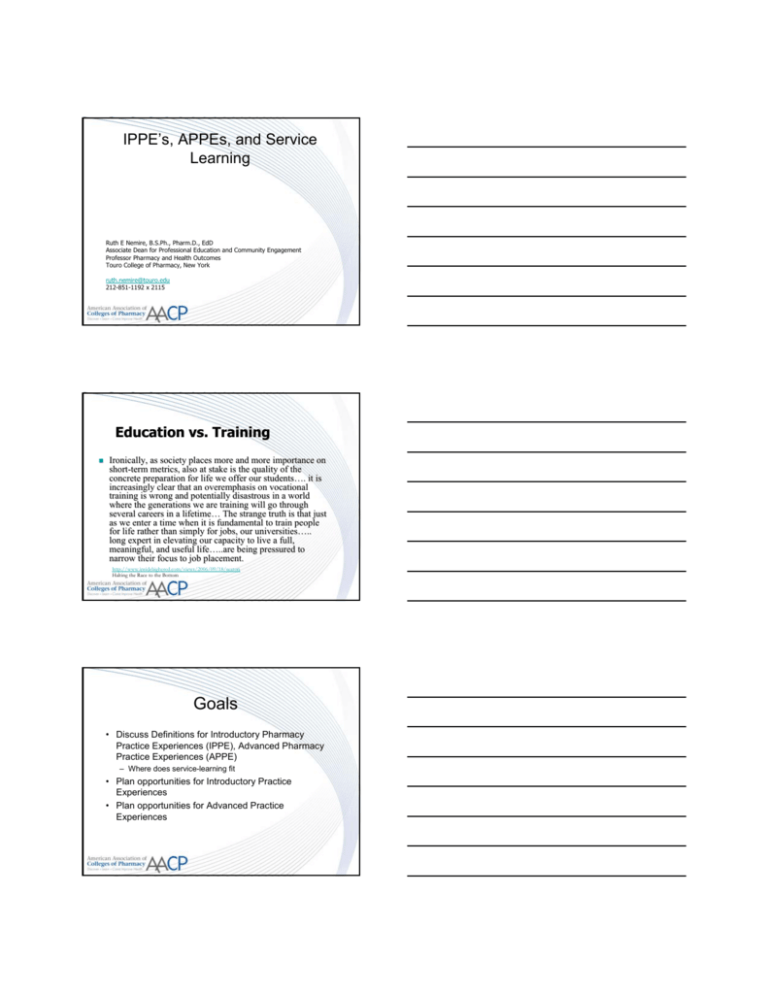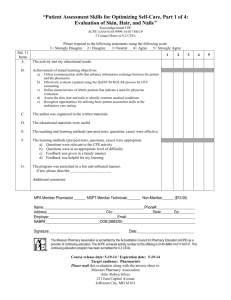IPPE's, APPEs, and Service Learning
advertisement

IPPE’s, APPEs, and Service Learning Ruth E Nemire, B.S.Ph., Pharm.D., EdD Associate Dean for Professional Education and Community Engagement Professor Pharmacy and Health Outcomes Touro College of Pharmacy, New York ruth.nemire@touro.edu 212-851-1192 x 2115 Education vs. Training Ironically, as society places more and more importance on shortshort-term metrics, also at stake is the quality of the concrete preparation for life we offer our students… students…. it is increasingly clear that an overemphasis on vocational training is wrong and potentially disastrous in a world where the generations we are training will go through several careers in a lifetime… lifetime… The strange truth is that just as we enter a time when it is fundamental to train people for life rather than simply for jobs, our universities… universities….. long expert in elevating our capacity to live a full, meaningful, and useful life… life…..are being pressured to narrow their focus to job placement. http://www.insidehighered.com/views/2006/09/18/sexton Halting the Race to the Bottom Goals • Discuss Definitions for Introductory Pharmacy Practice Experiences (IPPE), Advanced Pharmacy Practice Experiences (APPE) – Where does service-learning fit • Plan opportunities for Introductory Practice Experiences • Plan opportunities for Advanced Practice Experiences Defining Educational Experience Courses • Introductory Practice Experience: Early experience exposure to the practice of pharmacy outside the walls of the college of pharmacy. • Advanced Practice Experience: Experiential education for students building on previous IPPE and didactic courses with a goal to establish practitioners and expose students to the wide world of practice. • Service-Learning: A teaching methodology for use in courses. Service meets the learning needs of students and community defined needs by mutual agreement ACPE Standard 14 Experiential Education The pharmacy practice experiences must include •direct interaction with diverse patient populations in a variety of practice settings •involve collaboration with other health care professionals. •Most pharmacy practice experiences must be under the supervision of qualified pharmacist preceptors licensed in the United States. http://www.acpeaccredit.org/pdf/ACPE_Revised_PharmD_Standards_Adopted_Jan152 006.DOC Introductory Practice (IPPE) STANDARD 14.4 • Actual practice in community + institutional (5%) • Assume direct patient care responsibilities. • Other types of practice settings may be used. • IPPEs begin early and interface with didactic course work • Didactic course work should not be counted toward the curricular requirement http://www.acpe-accredit.org/pdf/ACPE_Revised_PharmD_Standards_Adopted_Jan152006.DOC IPPE • The introductory pharmacy practice experiences may use various formats, including: – shadowing of practitioners or students on advanced pharmacy practice experiences – interviews with real patients – service learning – real practice experiences in community, institutional, long-term care pharmacies, etc. Appendix C Additional Guidance on Pharmacy Practice Experiences http://www.acpe-accredit.org/pdf/ACPE_Revised_PharmD_Standards_Adopted_Jan152006.DOC IPPEs should consistently expose students to allow participation in activities such as, but not limited to: Appendix C • processing and dispensing new/refill medication orders • conducting patient interviews to obtain patient information • triaging and assessing the need for treatment or referral, • identifying patient-specific factors that affect health, • assessing patient health literacy and compliance • providing point-of-care and patient-centered services • conducting physical assessments • preparing and compounding extemporaneous preparations and sterile products Appendix C Additional Guidance on Pharmacy Practice Experiences http://www.acpeaccredit.org/pdf/ACPE_Revised_PharmD_Standards_Adopted_Jan152006.DOC Introductory Pharmacy Practice Experiences • Time for Participant ? – Concerns about IPPEs – Where should students be placed? – Innovative ideas? Advanced Practice ACPE Standard 14.5 Advanced Pharmacy Practice Experiences should: • Provide balanced required (the majority) and elective experiences • Enable achievement of stated competencies as demonstrated by assessment of outcome • Include primary, acute, chronic, and preventive care among patients of all ages • Develop pharmacist-delivered patient care competencies in the following settings: – – – – community pharmacy hospital or health-system pharmacy ambulatory care inpatient/acute care general medicine http://www.acpeaccredit.org/pdf/ACPE_Revised_PharmD_Standards_Adopted_Jan152006. DOC APPE • Most of the time should involve direct patient care • Must be 1440 hours (25% of curriculum) • Require active participation and patient care responsibilities, in a progressive fashion • General objectives as well as site-specific learning objectives should be established for all of the pharmacy practice experiences • Assessed through mapping objectives back to competency (expected outcomes) requirements Appendix C Additional Guidance on Pharmacy Practice Experiences http://www.acpe-accredit.org/pdf/ACPE_Revised_PharmD_Standards_Adopted_Jan152006.DOC Advanced Pharmacy Practice Experience Courses • Time for Participant ? – Concerns about APPEs – Where should students be placed? – Innovative ideas? ACPE Guidelines: S-L Service learning experiences although beneficial in developing desirable pharmacist student attitudes and values, do not necessarily qualify as introductory pharmacy practice experiences unless they specifically include activities that are directly related to medicine and pharmacy. (See Guidelines page Appendix C Additional Guidance on Pharmacy Practice Experiences http://www.acpe-accredit.org/pdf/ACPE_Revised_PharmD_Standards_Adopted_Jan152006.DOC Building Service-Learning as part of Experiential Education Course Establish relationships Build trust Work with the formal and informal leadership Seek commitment from community organizations Accept that community selfself-determination is the responsibility and right of all people http://www.health.state.mn.us/communityeng/disparities/principles.html http://www.cdc.gov/phppo/pce/part2.htm Service-Learning in the curriculum • Time for Participant ? – Concerns about service-learning – Where should students be placed? – Innovative ideas? – What counts as IPPEs • Only those service-learning experiences that can provide activities listed in the ACPE guidelines Conclusion: IPPE • Must be 5% of curriculum (300 hours) • Majority- community and institutional • May include other sites related to the practice of pharmacy. • Reflection and Case presentation on campus time used minimally. • Advancing to greater responsibility in APPE. • Service-learning can be used but must meet guidelines Conclusion: APPE • 25% of the curriculum (1440 hours) • Required and Elective mostly direct patient care • Advanced opportunities consistent with patient care, team interaction, professional behavior • Software system for managing practice experiences • Quality assurance of preceptors, sites and student achievement a requirement Conclusion: Service-Learning • Methodology that does not meet IPPE guidelines if not direct patient care oriented (Guideline Appendix C page xv) • Encouraged to be implemented throughout the curriculum • Differentiation of service-learning and clinical experiences often difficult to discern. Use the phrase “community defined needs” to help. Appendix C Additional Guidance on Pharmacy Practice Experiences http://www.acpe-accredit.org/pdf/ACPE_Revised_PharmD_Standards_Adopted_Jan152006.DOC Conclusion: Leading Innovation One size doesn't fit all Develop a community of higher practiced creativizers The 20/80 rule (Its easier to change 20% of the faculty by 80% than to change 80% of the faculty by 20%) Innovation only pays in the future Degraff, J., & Quinn, S., E. (2007). Leading Innovation. New York, NY; McGraw Hill.






